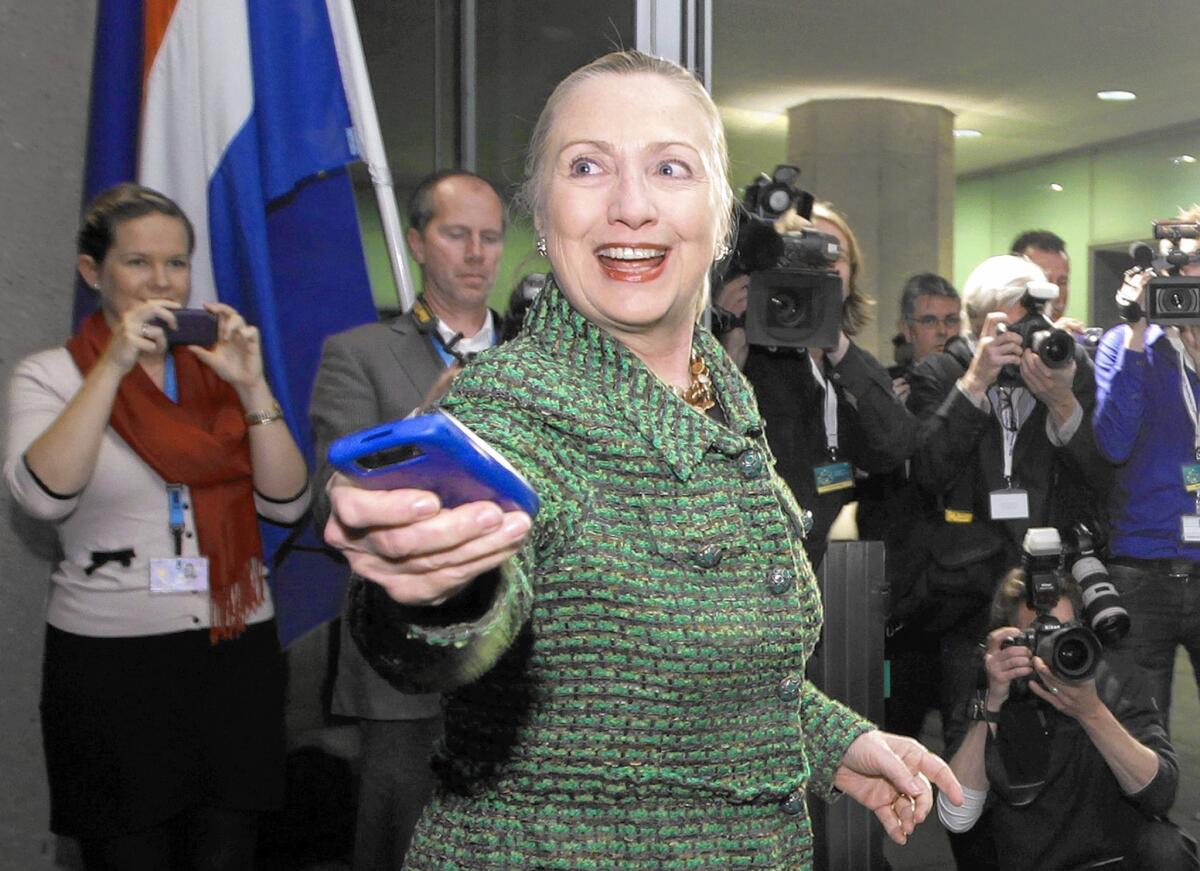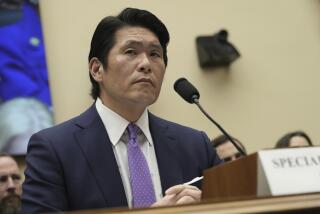A key word in the Clinton email investigation: ‘knowingly’

Reporting from Washington — Hillary Rodham Clinton’s use of a private email server while secretary of State may have been risky and politically unwise, but many experts in national security law predict it will not lead to criminal charges, based on what is known so far of her handling of classified government material.
That’s because even a misdemeanor charge for mishandling classified information would require proof that Clinton knew she was keeping government secrets at “an unauthorized location.”
Clinton has repeatedly said that she did not knowingly send or receive emails that were marked classified, and that her use of a personal email server — while not “the best choice” — was not illegal or unauthorized.
But these lawyers also caution that much remains unknown about Clinton’s unusual email system and they say the Democratic front-runner remains vulnerable, both politically and legally, because of the ongoing FBI inquiry and a newly energized Republican-led House committee investigating the 2012 Benghazi attack that killed the U.S. ambassador to Libya and three others.
That investigation appeared to be going nowhere, but it gained new focus in late February when GOP staffers learned for the first time why they had received only a handful of State Department emails to or from the secretary of State. They had not been told until then that Clinton had not used the State Department’s email server and instead relied exclusively on a personal system.
NEWSLETTER: Get the day’s top headlines from Times Editor Davan Maharaj >>
A few weeks later, after the House committee subpoenaed all of Clinton’s records, it learned that about 32,000 of her 62,230 emails had been erased from the server at the end of last year. In a March 27 letter, her attorney David Kendall said that her personal lawyers had gone through all the emails from her four years in office and the “Secretary chose not to keep her non-record personal emails.”
He said her work-related emails were given to the State Department and the server was erased. “Thus, there are no [email protected] emails from Secretary Clinton’s tenure … on the server for any review, even if such review were appropriate or legally authorized,” he said.
The statement spurred talk on the political right of obstruction of justice and destroying federal records, both of which are crimes. After the Enron scandal and revelations that audits had been shredded, Congress in 2002 adopted a broad obstruction of justice law.
It is a crime to “knowingly alter, destroy … conceal or cover up … any record or document” with the aim of impeding an investigation by “any department or agency” of the U.S. government. The law applies even to those who act in “contemplation” of a potential investigation.
Former Atty. Gen. Michael Mukasey, who served under President George W. Bush, wrote in the Wall Street Journal that Clinton could be ensnared by that law if she “wiped out emails” that were sought by the congressional committee. However, other prosecutors say the law has not been used in relation to investigations by House and Senate committees.
The Federal Records Act says a U.S. official may not “unlawfully conceal, remove [or] destroy” any official record in his or her custody. Clinton has said personal emails on her private server were not federal records.
Still, her emails are now a top focus of the Benghazi inquiry. Clinton will take time out from her presidential campaign on Oct. 22 to testify before the committee. And last week, as if to highlight the danger for Clinton, Bryan Pagliano, a computer specialist who helped set up Clinton’s email server, announced through his lawyer he is refusing to testify based on his 5th Amendment right against self-incrimination.
Democrats say the House investigation has become purely partisan and political. Rep. Adam B. Schiff (D-Burbank) said last week that the inquiry should end. “It’s clear that the Select Committee’s leadership no longer has any interest in investigating the attack in Benghazi, except for how Secretary Clinton’s email server may be used as fodder against the likely Democratic nominee for president,” he said.
But lawyers who represent clients charged with mishandling classified information say Clinton brought on the problems she now faces.
TRAIL GUIDE: All the latest news on the 2016 presidential campaign >>
“I’m still dumbfounded by how this happened,” said Washington attorney Mark Zaid, referring to Clinton’s use of a personal email system. “Didn’t someone ask: Why are you doing this? At the level of the secretary of State, it would be impossible not to have classified information sent through the system. There’s a level of arrogance here that says she was beyond all the rules.”
Clinton has noted that some of her predecessors, including Colin L. Powell, used personal email accounts.
There is no evidence Clinton sought to disclose or leak national secrets — the most serious offense. On the contrary, Clinton would not have publicly disclosed any of her emails had she not been forced to do so by other laws, such as the Freedom of Information Act.
Nonetheless, the law on mishandling classified information makes it illegal to “knowingly remove” classified information “with the intent to retain [it] at an unauthorized location.” And after leaving office, Clinton hired a company called Platte River Networks in Denver to retain the server with all of her State Department emails.
Two former CIA directors ran afoul of that law for moving classified information to an unauthorized location. John M. Deutch faced a possible criminal charge in 2000 for keeping classified information on his home computer, and former CIA Director Gen. David H. Petraeus agreed to plead guilty in April and pay a $100,000 fine for having given several notebooks containing highly classified information to a woman who was writing his biography.
But unlike in Clinton’s case, Deutch and Petraeus admitted they knew they had secret information that should have been kept secure. So far all of the Clinton emails in question were not marked as classified at the time she sent or received them, and only later were designated as classified.
Anne Tompkins, a former U.S. attorney in North Carolina who prosecuted Petraeus, disagreed with Mukasey’s assessment that the former secretary of State could be charged with mishandling classified information. “Petraeus knowingly engaged in unlawful conduct,” she wrote in a USA Today opinion piece last week, but Clinton said she did not believe she had sent or received classified information by email.
In late July, two inspectors general — both Obama appointees — said they were troubled to learn that classified information that “should have been marked and handled at the SECRET level” had been on Clinton’s email server and had been publicly released this year.
“This classified information should never have been transmitted via an unclassified personal system,” they said. They referred the matter to intelligence agencies and to the FBI, but added it was not “a criminal referral.”
Stewart Baker, who served as top national security lawyer under Presidents Clinton and George W. Bush, said it does not appear based on what is known now that Hillary Clinton committed a crime when she used a private email server.
“It was a bad idea, a serious lapse in judgment, but that’s not the same as saying it leads to criminal liability,” he said. On the other hand, the continuing inquiries could turn up damaging evidence, he said, including the possibility that foreign governments tapped into her emails.
“This investigation has a way to go, and it will keep drip, drip, dripping away for a long time,” he said.
Twitter: @davidgsavage
ALSO:
Clinton to push for reducing the impact of big money in campaigns
Would a presidential run by Joe Biden aim to knock Hillary Clinton out or serve as a standby?
Report finds ‘reason to believe’ Rep. Honda’s campaign blurred ethics lines
More to Read
Sign up for Essential California
The most important California stories and recommendations in your inbox every morning.
You may occasionally receive promotional content from the Los Angeles Times.











